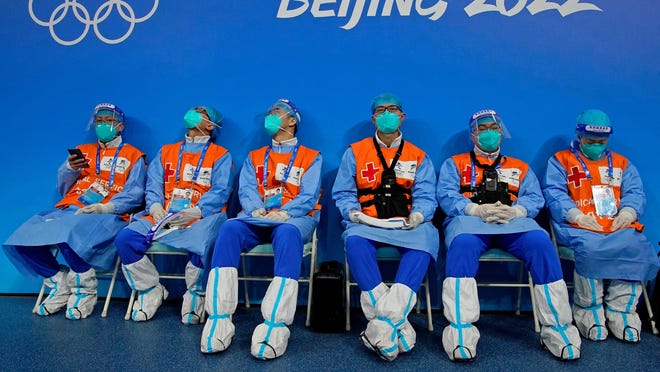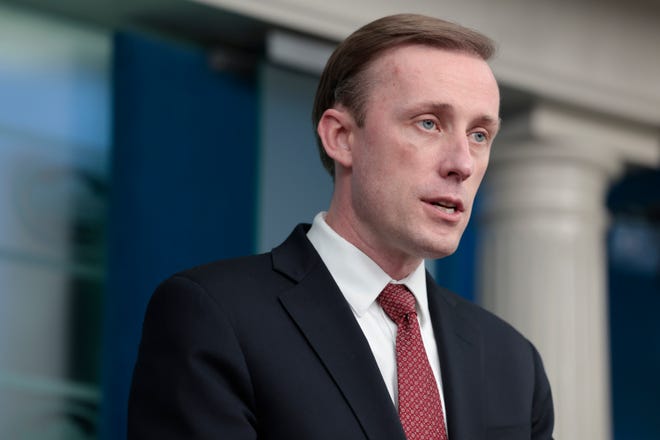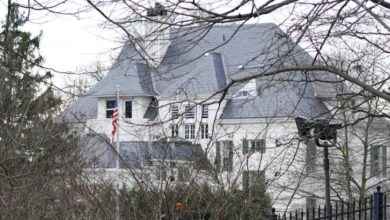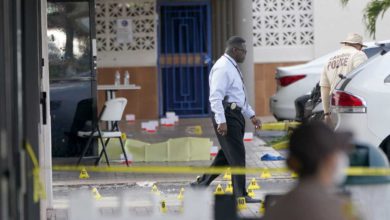
Washington and New Mexico announced they were dropping their indoor mask mandates Thursday, leaving Hawaii as the only state that has yet to set a date for lifting its mandate.
Washington's statewide indoor mask mandate will lift in most places on March 21, including at schools and child care facilities. New Mexico will drop its mandate immediately, which also includes schools.
Like the rest of the country, both states have seen a steady decline in both COVID cases and hospitalizations since the height of the omicron surge last month.
Democratic Gov. Michelle Lujan Grisham cited reduced COVID-19 risks and removed her mask at an indoor news conference alongside Democratic legislators and top officials from her administration.
“It’s not a political decision,” Lujan Grisham said. “It’s the right time for us. We are conquering COVID and we’ll keep doing that.”
CDC Director Dr. Rochelle Walensky said during a White House briefing Wednesday that the government is contemplating a change to its mask guidance in the coming weeks.
Also in the news:
►Los Angeles County Unified School District is ending its outdoor masking requirement starting next week, Superintendent Alberto Carvalho tweeted Friday.
►Police in Canada said Friday they were arresting protesters who have blocked traffic for weeks in Ottawa over the country's COVID-19 restrictions. The blockade in Canada’s capital was the last stronghold of the "Freedom Convoy" trucker protest.
►U.S. Surgeon General Dr. Vivek Murthy tested positive for COVID-19, he said Friday on Twitter. Murthy, his wife and two children, who also tested positive, were all experiencing symptoms but doing OK, he said.
►Three Milwaukee police officers are being investigated for allegedly creating fake COVID-19 vaccination cards to attend out-of-state training.
►Authorities made arrests from New York to Delaware to California Thursday as they rounded up 10 men accused of fraudulently reaping more than $4 million in unemployment benefits during the coronavirus pandemic.
►Offering a glimmer of hope, the Institute for Health Metrics and Evaluation estimates that 73% of Americans are now immune to the omicron coronavirus variant, a number some experts say means future surges could require far less disruption to society.
►With COVID-19 cases surging, Hong Kong's hospitals reached 90% capacity on Thursday. More than 6,100 new coronavirus infections were recorded in the city Thursday, and 24 deaths were reported over the last week.
📈Today's numbers: The U.S. has recorded more than 78.3 million confirmed COVID-19 cases and more than 933,100 deaths, according to Johns Hopkins University data. Global totals: More than 420.9 million cases and over 5.8 million deaths. More than 214 million Americans – 64.6% – are fully vaccinated, according to the Centers for Disease Control and Prevention.
📘 What we're reading: U.S. Education Secretary Miguel Cardona said Thursday it is the job of school leaders to listen to parents, students and educators as they continue to grapple with the lingering effects of the pandemic on the nation's public schools.
Keep refreshing this page for the latest news. Want more? Sign up for USA TODAY's free Coronavirus Watch newsletter to receive updates directly to your inbox and join our Facebook group.
New York won't enforce booster mandate for health care workers
New York will not enforce its mandate requiring health care workers to get COVID-19 boosters in light of concerns about staffing shortages, state health officials said Friday.
Gov. Kathy Hochul pointed to a troubling rise in breakthrough infections when she announced the mandate in January. Her administration set a Feb. 21 deadline. But state health commissioner Mary Bassett said Friday that the decision to drop enforcement of the mandate reflects the reality that booster rates remain low, particularly in nursing homes.
“While we are making progress with 75% of staff received or are willing to receive their booster, the reality is that not enough healthcare workers will be boosted by next week’s requirement in order to avoid substantial staffing issues in our already overstressed healthcare system,” Bassett said in a statement.
Bassett said state health officials will take another look at the booster mandate in three months to decide whether New York should take more steps to increase booster rates.
Utah joins California in plans to live in 'steady state' of coronavirus
Utah officials on Friday announced the state's plan no longer to treat COVID-19 like a pandemic and instead view it like other seasonal diseases.
Gov. Spencer Cox said the "steady state" model will begin March 31 by phasing out mass testing sites and less frequently reporting COVID-19 case counts. Cox said at-home tests, antiviral treatment and wastewater surveillance will help keep Utah cases and hospitalizations at manageable levels and monitor for new spikes, variants and outbreaks.
“Now, let me be clear, this is not the end of COVID, but it is the end — or rather the beginning — of treating COVID as we do other seasonal respiratory viruses,” Cox said.
The move is similar to what California Gov. Gavin Newsom on Thursday announced as a shift to an “endemic” approach to the pandemic. Instead of trying to extinguish the virus, Newsom said California would transition away from crisis mentality and focus on preparing for the inevitable twists COVID-19 may present in the future. The plan emphasizes increased vaccination and testing, fighting misinformation, stockpiling medical supplies and flooding areas of virus surge with temporary medical workers.
The plan also calls for boosting the state’s surveillance, including increased monitoring of virus remnants in wastewater to watch for the first signs of a surge.
California ended indoor mask requirements for vaccinated people Wednesday and will announce Feb. 28 how long the mandate for schools will remain in place.
– Jorge L. Ortiz and Ryan W. Miller, USA TODAY
Ivermectin, hydroxychloroquine prescriptions spiked in Republican counties in 2020, study finds
A research letter published Friday in JAMA Internal Medicine suggests COVID-19 treatment may be influenced by political affiliation.
Looking at medical claims data from January 2019 to December 2020, researchers at Harvard T.H. Chan School of Public Health compared prescription rates for hydroxychloroquine and ivermectin – two drugs that have shown to be ineffective against COVID-19 – with rates for two medications that are similar but have not been proposed as COVID treatments. They also looked at U.S. Census data and 2020 U.S. presidential election results.
Researchers found hydroxychloroquine prescriptions doubled from June through December 2020 compared to the previous year and were significantly higher in counties with the highest Republican vote shares. Ivermectin prescriptions in December 2020 were 964% higher than 2019 and also significantly higher in Republican-voting counties.
“This is the first evidence, to our knowledge, of such a political divide for a basic clinical decision like infection treatment or prevention,” said Michael Barnett, lead author and assistant professor of health policy at Harvard T.H. Chan School of Public Health.
– Adrianna Rodriguez, USA TODAY
NYC anime convention wasn't omicron superspreader, CDC says
An anime convention in New York City where one of the country's first cases of the omicron variant was detected late last year did not become a superspreader event thanks to widespread masking, vaccinations and indoor air filters, a Centers for Disease Control and Prevention study found.
The three-day November convention in Manhattan's Javits Center saw some 53,000 people convene from 52 U.S. jurisdictions and 30 foreign countries, yet only 119 positive cases were identified, the CDC found.
Masks were required, attendees had to have received at least one dose of a COVID-19 vaccine before attending and the venue had a high-efficiency particulate air filtration system installed. Those measures are likely what contributed to the low spread, the CDC study said.
The Oscars will require COVID tests for all guests, but not vaccines for all
The Academy of Motion Pictures Arts and Sciences has devised a complicated COVID-19 policy for guests attending the 94th annual Oscars in Los Angeles on March 27, USA TODAY has confirmed.
The New York Times reported Thursday that a pared-down list of invited guests – including nominees – will be required to show proof of COVID-19 vaccination and at least two negative PCR tests to enter. This year 2,500 guests be invited to watch the show inside the Dolby Theatre, which generally holds 3,317.
Meanwhile, show performers and award presenters will be required to undergo testing, but will not be required to show proof of vaccination, the Times reported.
Face covering requirements will also vary at the awards show depending on the seat location in the theater, according to the Times. High-profile nominees and their guests seated in a spaced-out orchestra section (closer to the stage and in the view of television cameras) will not be required to wear face masks.
– Bryan Alexander, USA TODAY
Contributing: The Associated Press








